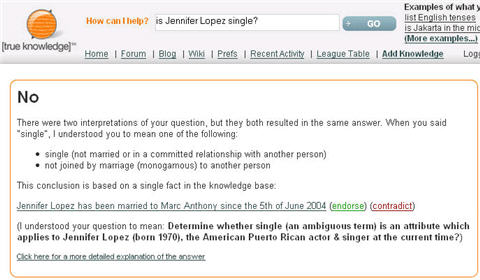True Knowledge enters the semantic search ring

True Knowledge is previewing (in private beta) a new search engine that deliver answers rather than a list of statistically relevant links as in most search engines. Type in "Is Jennifer Lopez single?," and the engine disambiguates the term "single," and produces a correct, structured response.
In addition, it presents the facts on which the answer is based, which users can correct if erroneous. An unambiguous version of what the engine thinks you asked is also shown, as well as standard Web search results. The system infers answers from knowledge in its database, which comes from external databases and users who add knowledge. The engine back end does semantic analysis and builds structure and concepts around the data.
The integrity of the database is influenced by users, who can remove incorrect facts or malicious data, and the system can eliminate data that is semantically incompatible with other knowledge that is used, said company founder William Tunstall-Pedoe.
The True Knowledge engine can respond to shorter search queries or entity names, for which it produces a profile. Users can add new profile templates for any class of object, and add knowledge in plain English.
In addition, external computers can query the knowledge base and get results via APIs. For example, a computer could ask for local time or geolocations based on IP addresses.
According to Tunstall-Pedoe, True Knowledge has developed a ways to capture information as discrete facts that can be understood by machines. "This creates a knowledge-base that is capable of learning, deducing the answer to a question from the information it already has and adding new information gained from interaction with the questioner to expand the depth and breadth of its knowledge," he said in a press release.
Tunstall-Pedoe calls himself an AI software developer and entrepreneur, and he is known for developing Crossword Maestro and Anagram Genius, which use AI techniques to solve word puzzles.
The technology concepts used in True Knowledge are similar to what Powerset, is doing with natural language, semantic search and user-contributed metadata, and in the same vein as semantic Web-oriented startups, such as Metaweb and Radar Networks.
"True Knowledge is a threat to Google and other search engines that rely on keyword search, as well as to natural language-based search companies," said Radar Networks CEO Nova Spivack. "In addition, it may be a new approach to building or at least leveraging public knowledge bases, such as the Wikipedia, or what Metaweb is making."
"Our Twine application is focused on helping individuals and groups manage and share their knowledge -- rather than public knowledge --so I don't see any overlap with True Knowledge. But it could be something to connect with later on," he added. "It is too early to tell whether True Knowledge is using or supporting W3C open standards for the Semantic Web, but if they do, then they are positioned to be the leading public knowledge base on the Web. If they don't then they will become just another silo of data. One thing is clear however, 2008 is shaping up to be the year of semantics."
Of course, for now True Knowledge is somewhat of a cipher given that it is not accessible to the public to test out its claims of machine intelligence. The company is based in Cambridge, England, and was recently funded wtih $1.2 million by Octopus Ventures.
Watch the screencast below
